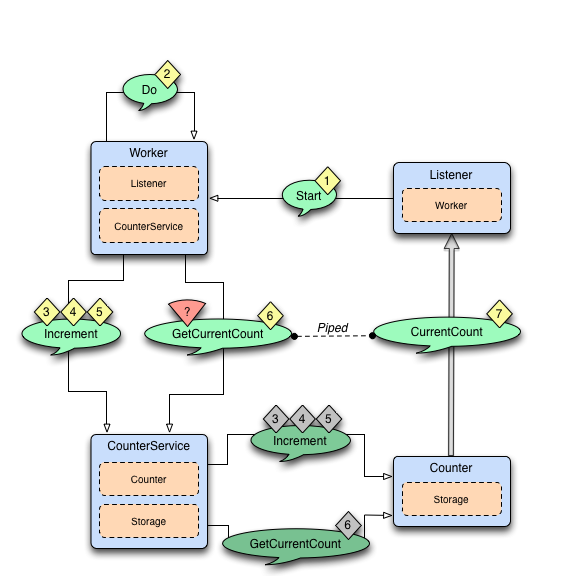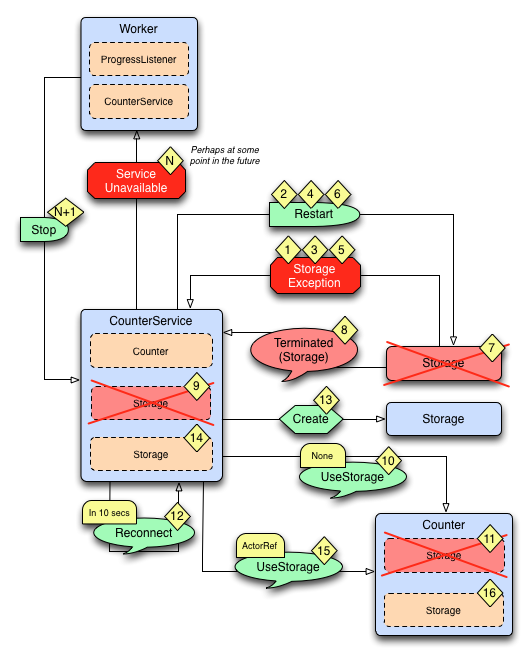容错示例

以上图示了正常的消息流。
正常流程:
| 步骤 | 描述 |
|---|---|
| 1 | 过程Listener启动工作。 |
| 2 | Worker通过定期向自己发送Do消息来计划工作 |
| 3, 4, 5 | 接收到Do时Worker通知CounterService更新计数器值,三次。Increment消息被转发给Counter,它会更新自己的计数器变量并将当前值发给Storage。 |
| 6, 7 | Worker向CounterService请求计数器的当前值并将结果回送给Listener。 |

以上图示了当发生数据库失败时的过程
失败流程:
| 步骤 | 描述 |
|---|---|
| 1 | Storage抛出 StorageException。 |
| 2 | CounterService是Storage的监管者,StorageException被抛出时它将重启Storage。 |
| 3, 4, 5, 6 | Storage仍旧失败,又被重启. |
| 7 | 在5秒内三次失败和重启后Storage被它的监管者,即CounterService终止。 |
| 8 | CounterService同时监视着Storage并在Storage被终止时收到Terminated消息... |
| 9, 10, 11 | 告诉Counter当前没有可用的Storage。 |
| 12 | CounterService计划一个Reconnect消息发给自己。 |
| 13, 14 | 收到Reconnect消息后它创建一个新的Storage... |
| 15, 16 | 并通知Counter使用新的Storage。 |
容错示例完整源代码
import akka.actor._
import akka.actor.SupervisorStrategy._
import scala.concurrent.duration._
import akka.util.Timeout
import akka.event.LoggingReceive
import akka.pattern.{ ask, pipe }
import com.typesafe.config.ConfigFactory
/**
* Runs the sample
*/
object FaultHandlingDocSample extends App {
import Worker._
val config = ConfigFactory.parseString("""
akka.loglevel = "DEBUG"
akka.actor.debug {
receive = on
lifecycle = on
}
""")
val system = ActorSystem("FaultToleranceSample", config)
val worker = system.actorOf(Props[Worker], name = "worker")
val listener = system.actorOf(Props[Listener], name = "listener")
// start the work and listen on progress
// note that the listener is used as sender of the tell,
// i.e. it will receive replies from the worker
worker.tell(Start, sender = listener)
}
/**
* Listens on progress from the worker and shuts down the system when enough
* work has been done.
*/
class Listener extends Actor with ActorLogging {
import Worker._
// If we don't get any progress within 15 seconds then the service is unavailable
context.setReceiveTimeout(15 seconds)
def receive = {
case Progress(percent) =>
log.info("Current progress: {} %", percent)
if (percent >= 100.0) {
log.info("That's all, shutting down")
context.system.shutdown()
}
case ReceiveTimeout =>
// No progress within 15 seconds, ServiceUnavailable
log.error("Shutting down due to unavailable service")
context.system.shutdown()
}
}
object Worker {
case object Start
case object Do
case class Progress(percent: Double)
}
/**
* Worker performs some work when it receives the `Start` message.
* It will continuously notify the sender of the `Start` message
* of current ``Progress``. The `Worker` supervise the `CounterService`.
*/
class Worker extends Actor with ActorLogging {
import Worker._
import CounterService._
implicit val askTimeout = Timeout(5 seconds)
// Stop the CounterService child if it throws ServiceUnavailable
override val supervisorStrategy = OneForOneStrategy() {
case _: CounterService.ServiceUnavailable => Stop
}
// The sender of the initial Start message will continuously be notified
// about progress
var progressListener: Option[ActorRef] = None
val counterService = context.actorOf(Props[CounterService], name = "counter")
val totalCount = 51
import context.dispatcher // Use this Actors' Dispatcher as ExecutionContext
def receive = LoggingReceive {
case Start if progressListener.isEmpty =>
progressListener = Some(sender)
context.system.scheduler.schedule(Duration.Zero, 1 second, self, Do)
case Do =>
counterService ! Increment(1)
counterService ! Increment(1)
counterService ! Increment(1)
// Send current progress to the initial sender
counterService ? GetCurrentCount map {
case CurrentCount(_, count) => Progress(100.0 * count / totalCount)
} pipeTo progressListener.get
}
}
object CounterService {
case class Increment(n: Int)
case object GetCurrentCount
case class CurrentCount(key: String, count: Long)
class ServiceUnavailable(msg: String) extends RuntimeException(msg)
private case object Reconnect
}
/**
* Adds the value received in `Increment` message to a persistent
* counter. Replies with `CurrentCount` when it is asked for `CurrentCount`.
* `CounterService` supervise `Storage` and `Counter`.
*/
class CounterService extends Actor {
import CounterService._
import Counter._
import Storage._
// Restart the storage child when StorageException is thrown.
// After 3 restarts within 5 seconds it will be stopped.
override val supervisorStrategy = OneForOneStrategy(maxNrOfRetries = 3,
withinTimeRange = 5 seconds) {
case _: Storage.StorageException => Restart
}
val key = self.path.name
var storage: Option[ActorRef] = None
var counter: Option[ActorRef] = None
var backlog = IndexedSeq.empty[(ActorRef, Any)]
val MaxBacklog = 10000
import context.dispatcher // Use this Actors' Dispatcher as ExecutionContext
override def preStart() {
initStorage()
}
/**
* The child storage is restarted in case of failure, but after 3 restarts,
* and still failing it will be stopped. Better to back-off than continuously
* failing. When it has been stopped we will schedule a Reconnect after a delay.
* Watch the child so we receive Terminated message when it has been terminated.
*/
def initStorage() {
storage = Some(context.watch(context.actorOf(Props[Storage], name = "storage")))
// Tell the counter, if any, to use the new storage
counter foreach { _ ! UseStorage(storage) }
// We need the initial value to be able to operate
storage.get ! Get(key)
}
def receive = LoggingReceive {
case Entry(k, v) if k == key && counter == None =>
// Reply from Storage of the initial value, now we can create the Counter
val c = context.actorOf(Props(classOf[Counter], key, v))
counter = Some(c)
// Tell the counter to use current storage
c ! UseStorage(storage)
// and send the buffered backlog to the counter
for ((replyTo, msg) <- backlog) c.tell(msg, sender = replyTo)
backlog = IndexedSeq.empty
case msg @ Increment(n) => forwardOrPlaceInBacklog(msg)
case msg @ GetCurrentCount => forwardOrPlaceInBacklog(msg)
case Terminated(actorRef) if Some(actorRef) == storage =>
// After 3 restarts the storage child is stopped.
// We receive Terminated because we watch the child, see initStorage.
storage = None
// Tell the counter that there is no storage for the moment
counter foreach { _ ! UseStorage(None) }
// Try to re-establish storage after while
context.system.scheduler.scheduleOnce(10 seconds, self, Reconnect)
case Reconnect =>
// Re-establish storage after the scheduled delay
initStorage()
}
def forwardOrPlaceInBacklog(msg: Any) {
// We need the initial value from storage before we can start delegate to
// the counter. Before that we place the messages in a backlog, to be sent
// to the counter when it is initialized.
counter match {
case Some(c) => c forward msg
case None =>
if (backlog.size >= MaxBacklog)
throw new ServiceUnavailable(
"CounterService not available, lack of initial value")
backlog :+= (sender() -> msg)
}
}
}
object Counter {
case class UseStorage(storage: Option[ActorRef])
}
/**
* The in memory count variable that will send current
* value to the `Storage`, if there is any storage
* available at the moment.
*/
class Counter(key: String, initialValue: Long) extends Actor {
import Counter._
import CounterService._
import Storage._
var count = initialValue
var storage: Option[ActorRef] = None
def receive = LoggingReceive {
case UseStorage(s) =>
storage = s
storeCount()
case Increment(n) =>
count += n
storeCount()
case GetCurrentCount =>
sender() ! CurrentCount(key, count)
}
def storeCount() {
// Delegate dangerous work, to protect our valuable state.
// We can continue without storage.
storage foreach { _ ! Store(Entry(key, count)) }
}
}
object Storage {
case class Store(entry: Entry)
case class Get(key: String)
case class Entry(key: String, value: Long)
class StorageException(msg: String) extends RuntimeException(msg)
}
/**
* Saves key/value pairs to persistent storage when receiving `Store` message.
* Replies with current value when receiving `Get` message.
* Will throw StorageException if the underlying data store is out of order.
*/
class Storage extends Actor {
import Storage._
val db = DummyDB
def receive = LoggingReceive {
case Store(Entry(key, count)) => db.save(key, count)
case Get(key) => sender() ! Entry(key, db.load(key).getOrElse(0L))
}
}
object DummyDB {
import Storage.StorageException
private var db = Map[String, Long]()
@throws(classOf[StorageException])
def save(key: String, value: Long): Unit = synchronized {
if (11 <= value && value <= 14)
throw new StorageException("Simulated store failure " + value)
db += (key -> value)
}
@throws(classOf[StorageException])
def load(key: String): Option[Long] = synchronized {
db.get(key)
}
}